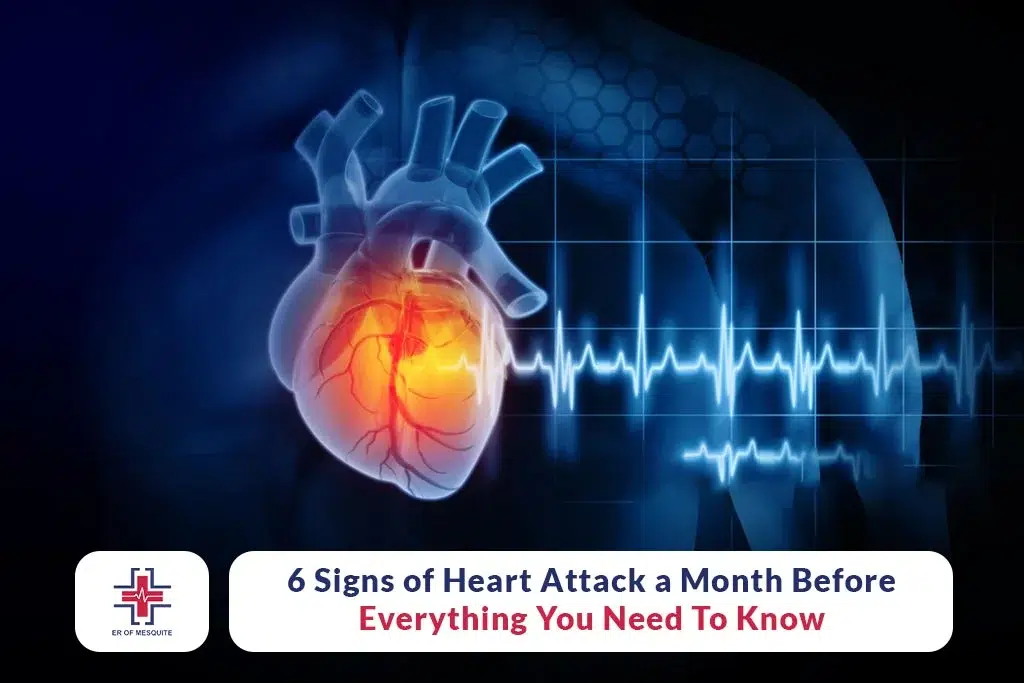6 signs of a heart attack a month before: Heart disease is the leading cause of death for both men and women. As depicted in movies, heart attacks do not always occur. Although heart attacks can occur silently or quickly, many patients may experience warning signals hours, days, or weeks in advance. You or someone you love may be able to save their life if you are aware of these warning signs and symptoms.
Numerous polls indicate that the leading cause of death for both men and women is heart disease. But the majority of the time, a lot of people ignore it. Indeed, a heart attack can strike unexpectedly or silently at any time.
But you can prevent a heart attack in advance. Indeed, there are some heart attack symptoms. These symptoms may even appear a month in advance of the heart attack. We’ll go over the top heart attack warning signals in this article. We will also discuss how to handle things. To learn more, reread the guide.
Understanding of 6 signs of Heart Attack a month before
A heart attack is a condition that damages the heart muscle and has the potential to be lethal. It can result from many things, such as obesity, smoking, high blood pressure, and insufficient exercise. When the arteries supplying the heart with blood become clogged, it can lead to a heart attack. A blockage in one or more coronary arteries may cause this. If the blockage is severe enough, it may result in breathing problems and chest pain (angina). In extreme cases, a heart attack can be lethal.
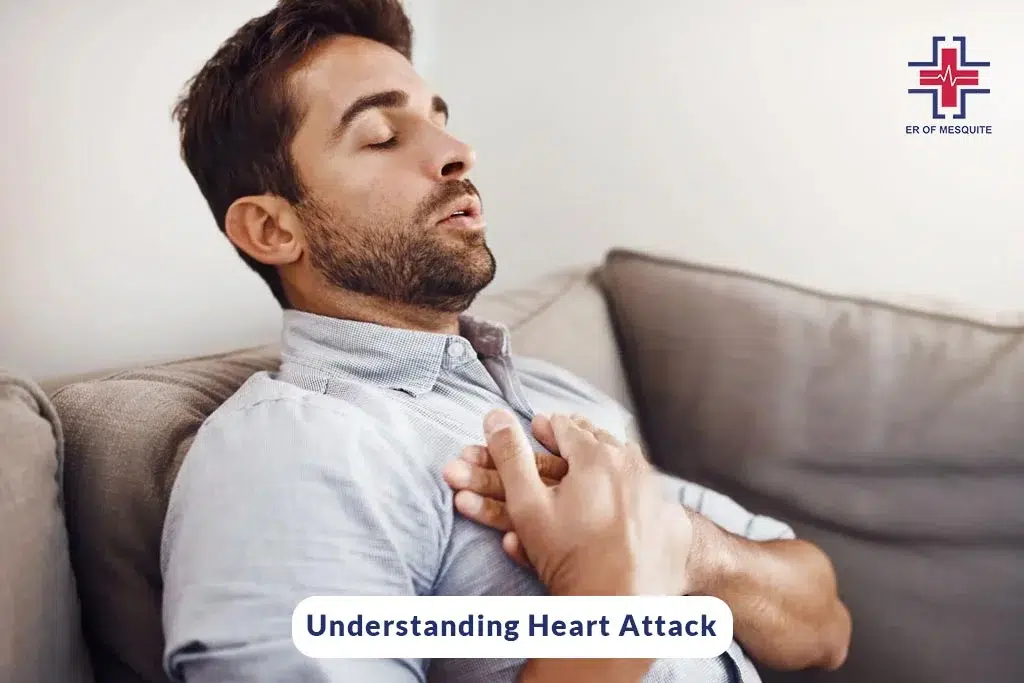
Cardiac arrest can be fatal if treatment is not received. Therefore, it’s critical to understand the signs and how to get assistance if you observe them.6 signs of heart attack a month before you must visit a doctor or the hospital as soon as you notice these symptoms! If something is wrong, you should still get looked out even if you don’t have any specific symptoms—your chances of making a full recovery from a heart attack increase with the timing of your therapy.
The article aims to inform readers about these warning indicators so they can seek prompt medical attention.
In the Month Leading up to a Heart Attack, What Symptoms Might You Experience?
Heart attack symptoms can appear months beforehand. It is most common for people to report chest pains, which are not always heart attacks.
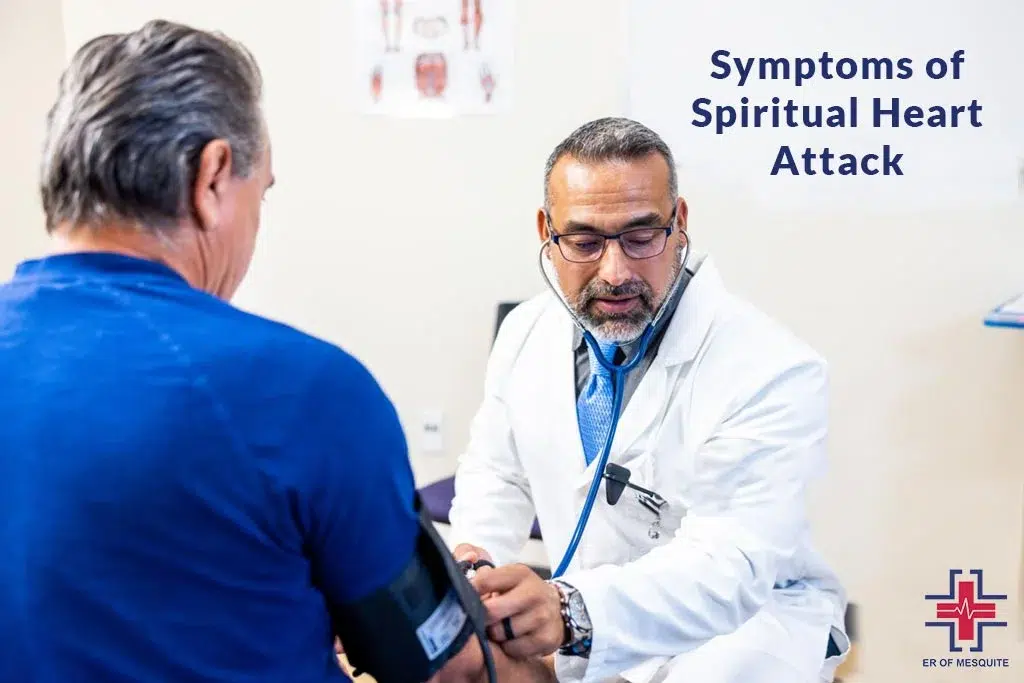
41.3% of participants in a 2023 research at one heart centre in Pakistan who received treatment for a heart attack showed prodromal symptoms. According to the authors, the results are consistent with data from earlier research that showed rates ranging from 45 to 59%.
Shortness of Breath
In The presence of dyspnea or shortness of breath is a serious warning signal related to cardiac health. This symptom may appear suddenly and even in the absence of physical activity.6 signs of heart attack a month before Routine activities that previously caused no discomfort, including walking about the house or climbing a short flight of stairs, may cause individuals to gasp for air or feel exhausted. Breathlessness can sometimes happen even while you’re at rest, so your heart isn’t pumping blood well enough.
This symptom develops due to the heart’s inability to efficiently pump blood enriched with oxygen throughout the body when it is not beating at its best. The outcome is a lack of oxygen reaching the lungs, which makes one feel out of breath. It is noteworthy that palpitations, exhaustion, and chest discomfort can also accompany shortness of breath, suggesting that there may be a cardiac problem.
Breathlessness can also appear differently in various people. Some people may feel they cannot breathe deeply, while others may notice a slow and steady onset of breathing problems over time. Furthermore, sitting down may exacerbate the sensation, leading to some people experiencing paroxysmal nocturnal dyspnea—a condition in which they wake up in the middle of the night gasping for air.
Abdominal Pain or Discomfort
When abdominal pain or discomfort coexists with other symptoms, it can be an unanticipated but important marker of cardiac problems. Due to the common misconception that stomach problems are related to heart problems, this kind of pain is frequently misinterpreted. 6 signs of heart attack a month before But occasionally, especially during a heart attack, the pain or discomfort may start in the chest and spread to the abdomen, causing feelings of fullness, indigestion, or a gnawing sensation in the stomach.
This type of abdominal pain is not the same as regular stomachaches or digestive discomfort; rather, it is heart-related. It could seem like a severe, deep pain inside that doesn’t go away after eating or when you shift positions. The pain may be moderate to severe, and nausea or upset stomach may accompany it. Sometimes, people may feel pressure or heaviness in the abdomen, which is comparable to having an overfull stomach, but there is no obvious food reason for it.
In light of the potentially serious underlying reasons, anyone with unexplained stomach pain or discomfort—especially with other symptoms—should immediately consult a doctor. To manage heart-related diseases and avoid more catastrophic problems, early identification and treatment are essential. This knowledge is essential because it can save lives to identify and address these less common symptoms.
Chest Discomfort or Pain
Chest pain or discomfort that is sharp and frequently referred to as an angina episode is a warning sign that should not be disregarded.6 signs of heart attack a month before Angina is a warning sign of an impending heart attack since it is brought on by a brief reduction in blood flow to the heart. The feeling can differ greatly from person to person. Some people describe it as feeling like a large weight has been placed on their chest, while others may describe it more as heartburn or indigestion. It’s crucial to remember that these sensations might appear at rest, after emotional strain, or even after physical exercise.
It’s critical to comprehend the nature of this chest pain. It may continue for several minutes or more, and its strength may change. Other body parts, such as the arms, shoulders, neck, jaw, or back, may also experience radiating pain.
Men and women may feel this discomfort in various ways, with women more likely to report nausea and jaw or back pain as ancillary symptoms.
Insomnia or Sleep Disturbances
Sleep disorders or insomnia might be mild but important signs of underlying heart problems.6 signs of heart attack a month before Periodic sleep disturbances are normal, but persistent sleep disorders or trouble getting or staying asleep may hurt cardiovascular health. These disruptions include difficulty falling asleep, waking up repeatedly during the night, or feeling lethargic even after a full night’s sleep. These symptoms are especially sneaky because of their mildness; they are frequently disregarded or confused with less serious conditions like stress or ageing.
Regarding heart health, sleep disorders might have several underlying causes. For instance, a significant risk of hypertension, arrhythmias, stroke, and heart failure is strongly linked to sleep apnea, a disorder marked by recurrent breathing disruptions during sleep. Poor sleep and the following oxygen deficiency can overwork the heart, causing new cardiac problems or aggravating pre-existing ones.
Furthermore, because insomnia and irregular sleep patterns influence other risk factors, they may indirectly affect heart health. Diabetes, high blood pressure, and obesity have all been related to poor sleep quality and are risk factors for heart disease. Moreover, long-term sleep loss can raise cortisol and other stress hormone levels, blood pressure and heart rate, and strain the heart more.
It’s equally critical to recognise that this relationship is reciprocal. Heart problems can bring on sleep disruptions, while heart disorders can be made worse by inadequate sleep. People who already have cardiac problems may find that their symptoms, like palpitations or chest pain, get worse at night and interfere with their sleep even more.
Anxiety or Unexplained Nervousness
A heart attack may have anxiety or unexplained anxiousness as a less common but potentially serious antecedent, particularly if it presents as an abrupt sense of impending doom.6 signs of heart attack a month before This kind of emotional symptom is frequently disregarded or completely ascribed to psychological causes, even though it may be directly related to heart health. Even without the classic signs of a heart attack, such as shortness of breath or chest discomfort, people may experience severe, unexplainable worry, a sense of dread, or a foreboding feeling that something is wrong.
This phenomenon is thought to be connected to the body’s intricate reaction to underlying physiological changes in the heart. The body’s “fight or flight” reaction can be triggered when the heart is under stress or has restricted blood supply, as in the case of a developing heart attack. This can result in a spike in adrenaline and other stress hormones. These hormones may cause trepidation, anxiety, and a feeling of approaching disaster.
It’s important to realise that these worry or anxiousness sensations can differ significantly from typical stress-related reactions. They frequently appear quickly, have a stronger intensity, and aren’t always related to a clear source of stress.
Moreover, there are gender differences in the presentation of these symptoms, with women more prone to have abnormal signals like worry or uneasiness in the context of a heart attack. As a result, patients and healthcare professionals must be aware of the symptoms of these uncommon heart disorders.
Anyone experiencing unexpected, unexplained sensations of worry or a sense of impending doom should seek medical attention right away due to the potential consequences, especially if other symptoms accompany them. To avoid a heart attack, prompt detection and treatment are essential. Comprehending the connection between cardiac health, both physically and emotionally, is essential to providing complete care.
Fatigue or Unusual Tiredness
Regarding heart health, fatigue or atypical weariness is more than just a hangover or exhaustion from a hard day.6 signs of heart attack a month before It is a severe tiredness that does not go away with rest and may be a sign that the heart is not working as well as it should. Vital organs and muscles do not get enough oxygen and nourishment when the heart cannot pump blood efficiently. Due to improper circulation, even basic chores might feel excessively tiring and cause a chronic feeling of exhaustion.
This exhaustion can be especially confusing as it might not be connected to noticeable physical effort. People may experience extraordinary fatigue when performing daily tasks like grocery shopping, doing light housekeeping, or even getting dressed. It’s a persistent, deep fatigue that doesn’t seem to have an obvious reason and doesn’t go away when you sleep or rest.
Crucially, unexpected weariness or exhaustion can seem different in various people and different groups, such as women and older adults, and it can also be more subtle in these groups. Particularly in women, weariness might be the main sign of cardiac problems, frequently without the traditional chest pain. It is, therefore imperative that anyone who has chronic, inexplicable exhaustion get medical attention, particularly if they have heart disease risk factors. The quality of life can be greatly enhanced, and the risk of more major cardiac events can be decreased with early detection and care.
How to Deal With The Symptoms of a Heart Attack
You are now aware of the common signs of a heart attack. Having these indicators, however, helps you avoid serious medical disorders. You should take a few simple actions to enhance your health in this situation. Let’s investigate how:
Rest: Generally speaking, these symptoms come on when your life is hectic. Resting is the only approach to dealing with these issues. These symptoms don’t always have anything to do with heart health. If it does not improve after a few days, you should consult a doctor.
See Your Doctor: It is best to get medical attention if you or a family member exhibits these symptoms. Hence, speaking with a qualified physician is the greatest strategy to prevent a serious heart attack.
Give Information: You must provide the appropriate information to a medical team when they arrive. Don’t forget to provide your prescription history and medical history.
Heart Attack Prevention: How to Reduce Your Risk
Alright, you’re all right now. However, no one can foresee the future. Most reports claim that our lifestyle may cause poor health conditions. For this reason, there are steps you can take to lower your chance of having a heart attack. We’ll share the following suggestions:
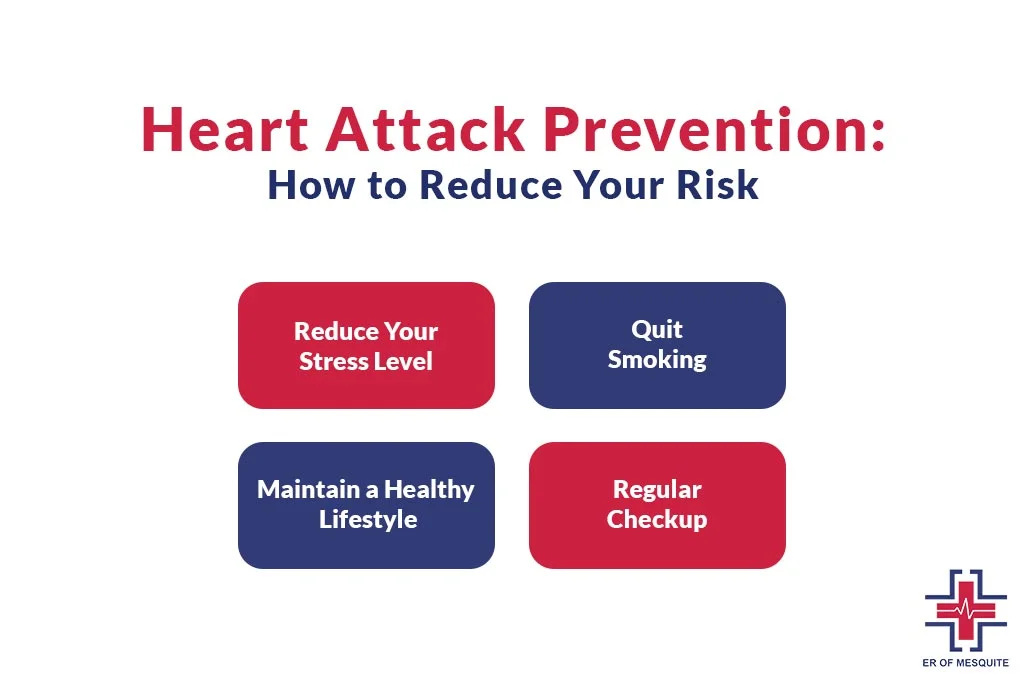
Reduce Your Stress Level
Another significant contributor to poor heart health is stress. Having a stressful life can increase a lot of health issues. Nor can we rule out heart attacks in this case. Thus, to maintain heart health, you must minimize stress.
Quit Smoking
Smoking has other harmful effects besides cancer. Regular smoking can lead to a plethora of problems. Smoking harms your heart. It’s time to give up smoking if you have been a smoker for a long time. Seek expert assistance to complete the procedure.
Maintain a Healthy Lifestyle
As we’ve previously mentioned, living an unhealthy lifestyle can be the primary cause of a heart attack. Thus, you must continue to lead a healthy lifestyle if you wish to lower the risk. You must then have a well-balanced diet. To stay healthy, keep a healthy weight and engage in moderate exercise.
Regular Checkup:
No matter what your age or what health problem you have, frequent health check-ups can resolve a lot of things. A serious attack or other complex heart conditions may be prevented if a doctor monitors you.
Symptoms of Spiritual Heart Attack
Many people nowadays suffer from serious cardiac problems as a result of not developing a healthy love in their hearts. I’m talking about spiritual and emotional heart disorders in addition to medical heart issues. Ignoring the range of emotional experiences that people have—such as joy, satisfaction, loss, grief, and sorrow—leads to these conditions.
-
- Weekly worship attendance becomes sporadic and voluntary. We were made to be worshippers by God. He came looking for us, and we worshipped Him as the real, living God, turning our hearts away from idols. Weekly worship neglect may indicate a spiritual arrhythmia in one’s heart.
-
- a hurried approach to prayer. Infrequent prayer does not bring in the oxygen of God’s grace in a constant knowledge of Him and dependency upon Him, much like breathing difficulties and gasps for air. Those with this problem frequently inhale shallowly during periodic prayer, failing to fill their lungs, or they may hyperventilate in a state of intense anguish.
-
- spiritual apathy. Arteriosclerosis, or hardness of the heart, is manifested by indifference to the things of God and tolerance for things that insult Him. Isolation from other believers, who might encourage us in the practice of love and protect us from the deceitfulness of sin, is one element that contributes to this condition.
-
- A poor diet and insufficient appetite. God’s Word provides us with all the necessary nutrients for our growth in grace—truth. However, we are willing to occasionally nibble on a nugget without truly appreciating its gospel depth through contemplation.
-
- Passivity. A heart grows weaker when it is not strengthened by performing acts of service. Unlike the One whose heart was whole, it appears to be served rather than to serve.
-
- The gospel no longer stimulates the sick heart. God’s incredible love, demonstrated in the gift of His Son, does not give our lives the rush of divine grace. God uses the sacraments and the teachings of Christ to help revive our waning spirits.
How Long Do Symptoms of Heart Attack Last
The duration of heart attack symptoms might range from a few minutes to many hours. The symptoms of a heart attack usually subside after a few days, and persistent symptoms could indicate a chronic heart problem or another illness. Get in touch with your doctor right away if your symptoms continue.
Causes and Risk Factors of Heart Attack
Heart attacks are most commonly caused by coronary artery disease (CAD). People with CAD have less oxygen-rich blood flowing through their hearts because their coronary arteries narrow more quickly. This results from a waxy plaque accumulation on the arterial walls that worsens with time.
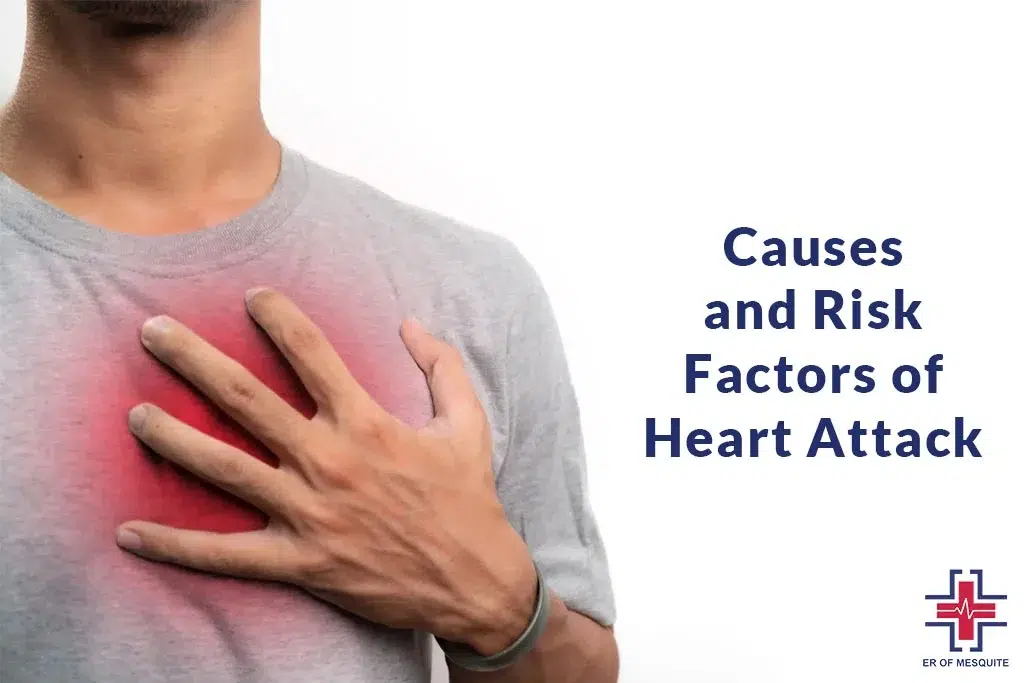
When plaque breaks off, it may cause a blood clot that stops the heart’s blood supply, which means that if treatment is delayed, the heart’s muscles will begin to fail.
Less frequent reasons consist of the following:
-
- The coronary artery occlusion is brought on by an abrupt spasm; this condition is more common in people who smoke and use illegal drugs like cocaine.
-
- A coronary artery rupture is more common in women under 50, pregnant women, and persons with Marfan syndrome.
-
- A coronary artery embolism is more likely in people with atrial fibrillation and occurs when a blood clot moves from the heart into the coronary artery, obstructing it.
The following manageable factors can influence the risk of a heart attack:
-
- A diet heavy in salt, saturated, and trans fats
-
- Sedentary lifestyle with little movement or exercise; smoking
Many illnesses that are included in the metabolic syndrome can potentially raise your chance of developing heart disease. These include diabetes, obesity, and elevated levels of the subsequent:
-
- Blood pressure
-
- Triglycerides
-
- Blood sugar
-
- Cholesterol.
Age raises the chance of a heart attack. High risk is also associated with a family history of heart attacks, especially in the case of young relatives who experienced heart attacks.
FAQs
Q: What are the early signs of a heart attack occurring a month before?
A: Early signs of a heart attack a month before may include unusual fatigue, shortness of breath, chest discomfort, and sleep disturbances. Understanding these signals can prompt timely intervention for better heart health.
Q: How can I differentiate between joint discomfort and early signs of a heart attack?
A: Distinguishing joint discomfort from early heart attack signs involves attention to symptoms’ intensity, duration, and recurrence. Seek medical advice if you experience persistent or escalating discomfort.
Q: Can lifestyle changes help prevent a heart attack a month in advance?
A: Adopting a heart-healthy lifestyle can significantly reduce the risk of a heart attack. To promote cardiovascular health, maintain a balanced diet, exercise regularly, manage stress, and avoid tobacco.
Q: Should I seek medical attention if I experience these early signs, even if they seem minor?
A: Yes, it’s crucial to seek medical attention if you experience any early signs of a heart attack, even if they seem minor. Timely intervention can prevent complications and improve outcomes.
Q: Can age or gender influence the manifestation of these early heart attack signs?
A: Yes, age and gender can influence how early heart attack signs manifest. Women, for example, may experience atypical symptoms. Understanding these variations can aid in accurate recognition and timely response.
Conclusion
At ER of Mesquite, we prioritize the well-being of our community, offering comprehensive services to address heart health concerns. Our dedicated team specializes in heart attack treatment, employing advanced medical interventions to stabilize patients and initiate recovery. Additionally, our facility provides cardiac enzyme test and EKG tests, essential diagnostic tools that enable swift and accurate assessments of cardiac health. By combining expertise with state-of-the-art technology, we strive to ensure that individuals experiencing potential cardiac issues receive timely and effective care, promoting better outcomes and an enhanced quality of life.
